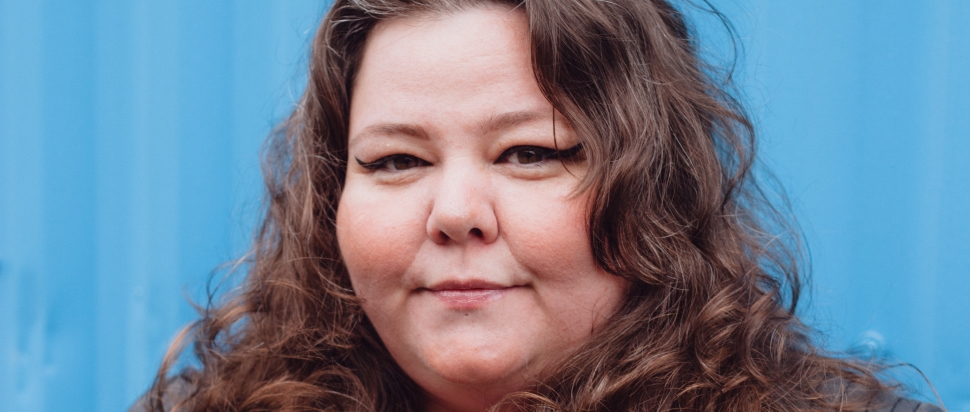Alice Slater on her true crime-inspired debut Death of a Bookseller
We chat with Alice Slater about her fierce, grimy debut Death of a Bookseller and the legacy of true crime in fiction and beyond
Picture the ultimate true crime fan. Dark eyeliner, chipped nail polish and a black T-shirt emblazoned with the words 'Ted Bundy: the original heartstopper'. And then imagine her antithesis – someone who tries not to dwell on darkness. Someone in a neat, vintage dress perhaps. Someone who matches their handbag to their heels, and finds murder documentaries exploitative. Maybe someone for whom crime is not a form of entertainment, but a very real part of their life experience.
Now imagine these two characters thrown together as booksellers in a Walthamstow chain bookshop, and you have the set-up for Alice Slater’s debut novel Death of a Bookseller. Roach is antisocial and addicted to true crime podcasts. She loves the sanctuary of the bookshop but is less fond of the customers. Laura, on the other hand, loves to talk about books and is passionate about her favourite authors. But Laura has a dark secret, and when Roach starts to show an unhealthy interest in uncovering it, Laura fights with everything she has to keep it hidden.
Death of a Bookseller captures the push and pull of true crime. Its two main characters personify both the morbid fascination we have with hits like Serial, Making a Murderer, Dahmer, Tiger King and My Favorite Murder, as well as the inevitable backlash against them. The recent boom in true crime books, television series and podcasts begs the question: why are we so drawn to stories of death and destruction? And is it ethical to continue engaging with them?
As we speak over Zoom on a cold, rainy night in March, Slater tells me that she immersed herself in true crime to write Death of a Bookseller. Books like Michelle McNamara’s I’ll Be Gone in the Dark about the recently apprehended Golden State Killer and Savage Appetites by Rachel Monroe, which explores our cultural fascination with crime, crept into her everyday.
“I couldn’t have written Death of a Bookseller if I wasn’t a bit of a true crime fan,” she says, “but… look, you know when you’re really looking forward to Christmas? You’re buying all your Christmas booze, you’ve got all your amazing food and you’re just really jazzed for it? And then when the season hits, you gorge on it, and you just don’t even want to see another bottle of Baileys. I kind of feel like that right now.
“I had to read a lot of stuff, and listen to a lot of podcasts in a really short length of time, and I kind of overdosed on it. I feel now, on the other side of writing Death of a Bookseller, that I’m actually less interested in true crime than I ever have been.”
In writing the book, Slater journeyed all the way from Roach’s true crime obsession, to Laura’s distaste for the genre. And although Death of a Bookseller is in many ways a critique of the ways in which we consume true crime, it could be argued that the novel itself is part of the crime writing tradition. An exploration of the complexities of female friendship, and the way obsession can lead us to do unimaginable things, Death of a Bookseller has shades of Gillian Flynn and Lucy Foley; much like these authors, Slater drew on true crime to inform key sections of the novel. Indeed, some of Roach’s increasingly strange behaviours draw on the terrible deeds of the Manson Family.
“Roach actually refers to [her activities] as creepy crawling,” Slater says, “which is what the Manson Family used to do. They would break into people’s houses, move things around, just enough to unsettle them.” Roach’s behaviour has its roots in stories told over and over again, by true crime fans everywhere. True crime is not just the subject matter of Death of a Bookseller, but woven into its very fabric.
Yet amidst the drama, crime and darkness, Death of a Bookseller is also an exploration of the art of bookselling. Roach and Laura work (with ever increasing animosity) in a struggling branch of a chain bookshop. By turns dusty, awkward, boring, inspiring and joyful, this setting is painted with such detail because Slater herself was a Waterstones bookseller for six years.
“I love bookselling,” Slater says. “But I wasn’t just trying to write a love letter to bookselling, I also wanted to show the corporate side of it… I feel like independent bookshops tend to be the territory for fiction, so I just wanted to try something a little closer to my experience.”
The result is the perfect backdrop for Death of a Bookseller’s drama to play out. A tired, corporate bookshop, with a future as uncertain as those of Roach and Laura themselves.
Death of a Bookseller is out on 27 Apr with Hodder & Stoughton
Slater’s upcoming book tour will take her to bookshops (large and small) all around the country, including Edinburgh’s own Portobello Books on Tue 2 May
